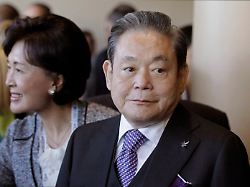Mega inheritance tax
Samsung heirs sell shares worth billions for the tax office
By Max Bourne
January 15, 2024, 3:11 p.m
Listen to article
This audio version was artificially generated. More info | Send feedback
The descendants of the Samsung founder are facing a problem that is unknown to German business heirs: They are liquidating billions in assets to settle one of the highest tax bills in the world. They rely on debt and art donations to maintain their corporate empire.
The heirs of Samsung Group founder and long-time patriarch Lee Kun-hee have sold billions of dollars worth of shares in the company to pay part of the highest inheritance tax payments ever. Lee, the former richest person in South Korea, died in 2020. He left his family a fortune estimated at the equivalent of almost 20 billion dollars (currently around 18 billion euros). However, according to Korean law, the heirs are only entitled to a good half of it, the other half to the state. South Korea has an inheritance tax rate of 50 percent, and – unlike Germany, for example – this also applies to assets held in family businesses.
Filings with South Korea’s stock market regulator show that Lee Kun-hee’s widow, Hong Ra-hee, and her daughters Boo-jin and Seo-hyun collectively sold $2 billion worth of stocks last week. These included shares worth $1.64 billion in device and chip giant Samsung Electronics and shares worth about $405 million in subsidiaries Samsung SDS, Samsung C & T and Samsung Life Insurance.
The sale only covers one installment of the tax bill that was set at the equivalent of more than $9 billion three years ago. Large fortunes like the Lees’ are often tied up in company shares. High inheritance tax demands present the owner families with the problem of having to sell their companies or parts of them or withdraw business assets in order to settle the tax debt. This can cost the owner family control over the company and harm the company because, for example, there is a lack of capital for investments. That is why assets held in companies are exempt from inheritance tax in Germany. Particularly large inheritances therefore often remain almost completely tax-free. This always causes criticism. However, business associations have so far successfully shrugged off warnings of damage to German medium-sized businesses.
“Civic duty” to pay taxes
This argument is apparently foreign to the Lee family. “It is our civic duty and responsibility to pay all of our taxes,” the family said when the 2021 mega tax bill was assessed. However, the Samsung heirs did not put the billions of dollars on the table in one fell swoop. In order not to sell too many company shares and lose control of the company, the family took on the equivalent of three billion dollars in debt, for which they deposited Samsung shares as security.
Part of the plan agreed with the tax authorities to pay off the billion-dollar debt also includes the family donating around 23,000 works of art, including works by the Spanish surrealist Salvador Dalí and the cubist Pablo Picasso, to South Korean museums. Additionally, the family plans to donate $900 million to charity.
So far, the heirs have reportedly paid around 4.5 billion, almost half of the inheritance tax. The last installment is due in 2026.
